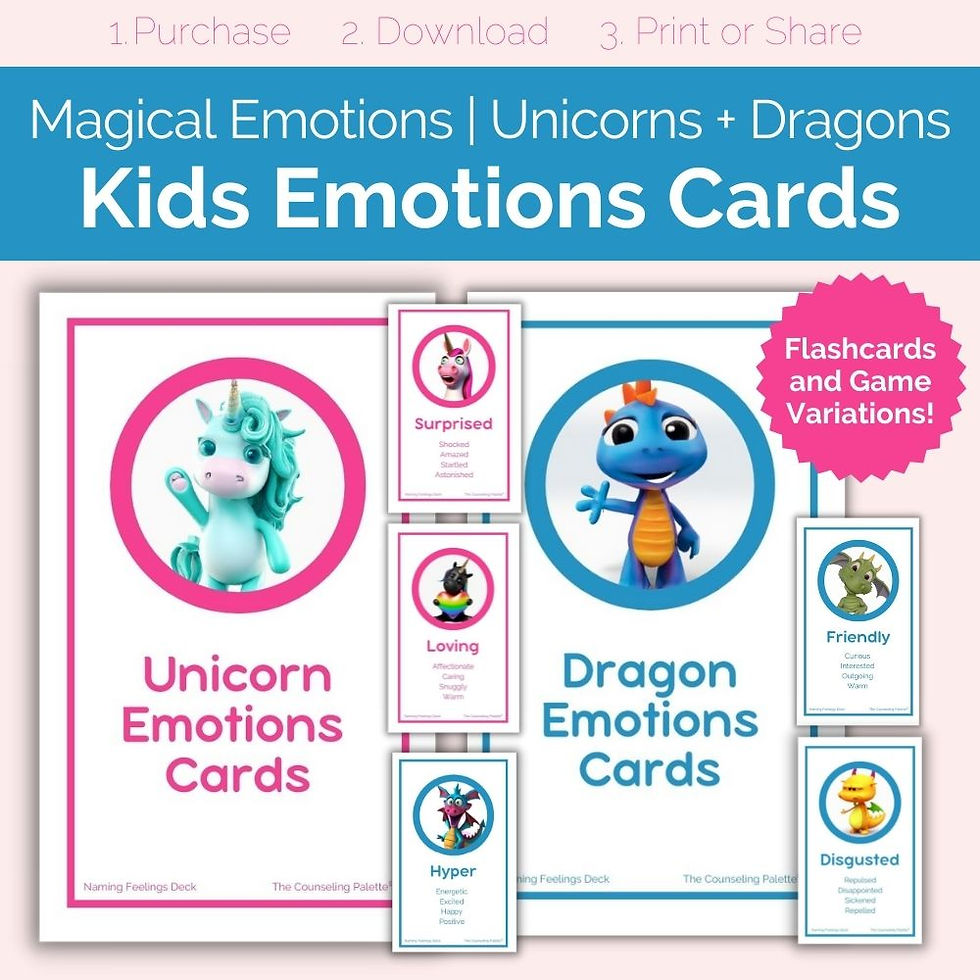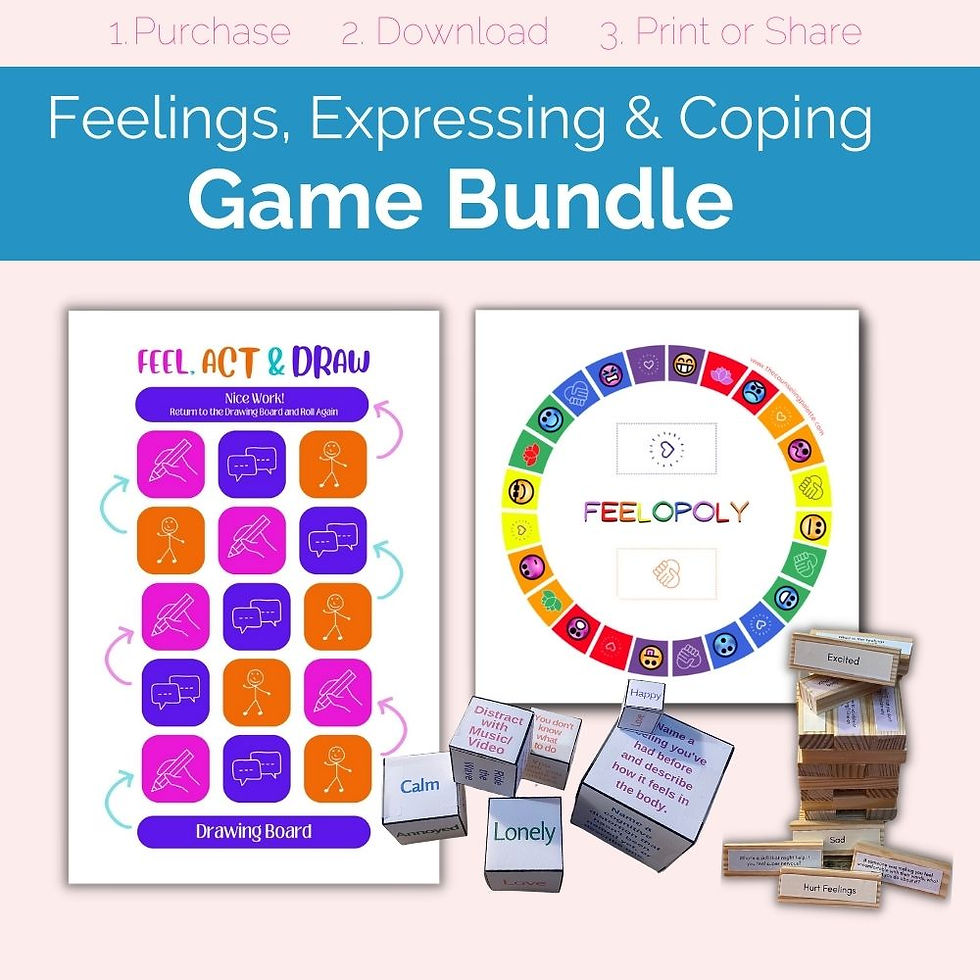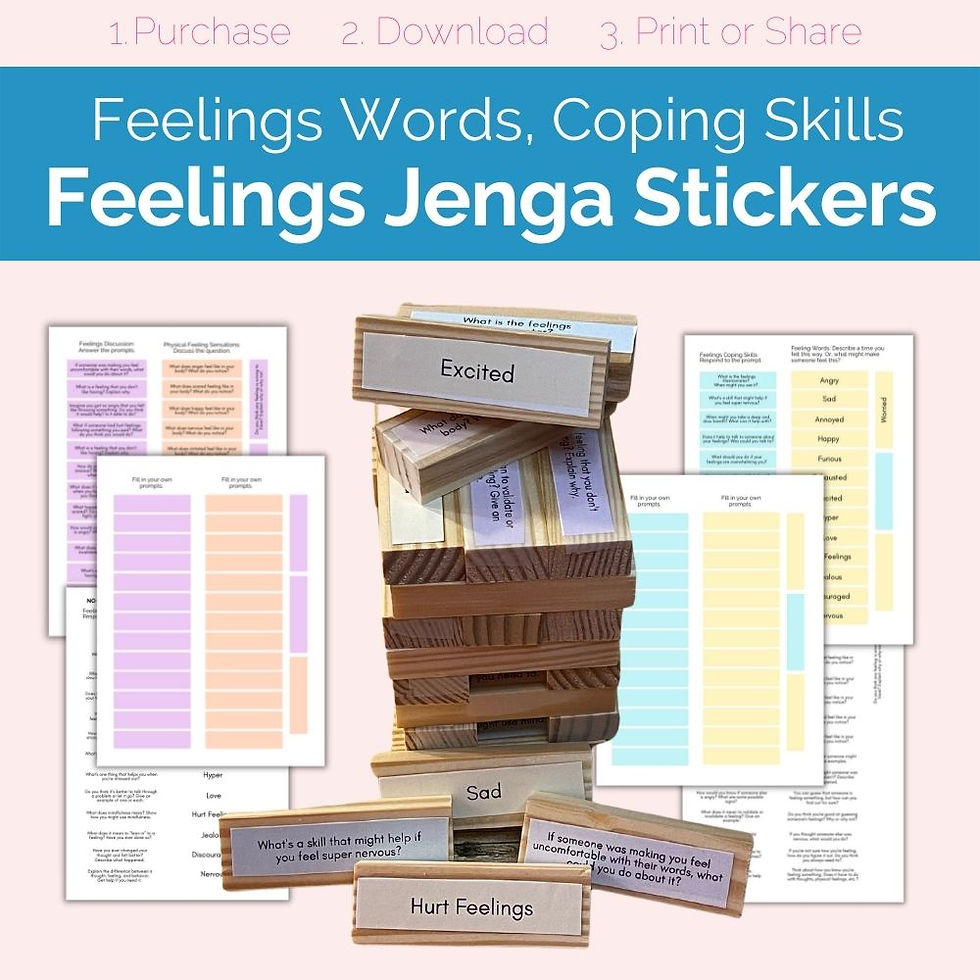Explore the best ideas and tools for kids to learn and apply coping skills.
It can be challenging, if not overwhelming, to help kids struggling with emotions. Most parents and teachers I know say they feel frustrated at times. And if children have extra struggles like trauma, ADHD, or learning differences, it's even harder.
So how do you keep kids engaged and interested, especially when they've "heard about all of this before"? Interactive techniques can help shake things up, sometimes literally!
Here are some creative ways to teach and practice coping skills for kids, along with supportive resources for each.
Looking for kids coping skills support right away? Visit here to check out our kids coping cards.
Article Highlights
1. Coping Skills Cards
What better way is there to learn coping skills than with fun cards? Coping skills cards can help kids practice and reinforce what they're learning. Plus, when you're upset, it's hard to think clearly and remember skills.
Handy cards can help you remember in the moment. And for those who primarily learn visually, the images with the cards can make a big difference.
For a quick and easy method, children can create their own coping cards.
Have them cut out card-sized paper, or use index cards. Draw, write, and paste on visual reminders of skills.
If you're looking for something a little more substantial, there are also decks you can order or download. Here are some options.
Kids Magical Coping Skills Cards
Our set of Kids Magical Coping Skills Cards are unicorn and dragon-themed with fun and memorable visuals. The cards are downloadable, so you can print multiple copies for yourself or your own clients. They cover five categories of skills, including:
Mindfulness
CBT (cognitive/thinking) skills
Creativity
Exercise/movement
Distraction
Kids can choose the cards they prefer or draw randomly. I find that children can successfully use one skill for a while, and then may need to mix it up. This set has 50 cards along with blanks to add your own.
Kaplan Self-Calming Cards
Looking for a pre-printed deck? This set of self-calming cards has creative options, such as “get a hug” when you need it. Visit here to see the cards for yourself.
Calming Strategy Deck
The calming strategy deck by Be Clever Wherever has similar prompts such as “talk to someone” along with a cute panda theme. You can also order it online. Check it out here.
2. Emotions flashcards
How do you explain that you’re angry or have hurt feelings, when you don’t know the difference? How can you tell that someone else is sad today, but it’s not your fault? Language helps.
That’s where emotions cards of all kinds come in. You can use the tools as flashcards, a deck to shuffle through, for games, or a conversation starter about feelings.
Some ways to use feeling cards include:
Notice feelings in the body (ie, shaking hands)
Discuss benefits of feelings
Talk about how big emotions can be confusing
Discuss triggers of certain emotions, like anger or anxiety
Discuss how to roll with feelings when appropriate
Practice ways to lower the intensity of feelings, like overwhelming anger
Challenge negative thoughts about certain triggers that lead to overwhelm
Here are some potential feeling decks to get you started.
Magical Emotions Cards
The Magical Emotions Cards are a fun, downloadable and printable fantasy-themed card set featuring dragons and unicorns.
You can separate out the creatures, or mix the decks together. It also includes variations for familiar games like Go-Fish, that feature feelings words.
The deck also combines well with the Kids Magical Coping Skills Deck shown above. Or, you can get both of the decks and many more printable resources with the Counseling Palette's Entire Store Bundle. Learn more here.
Dealing in Feelings
The Dealing in Feelings card deck includes faces of real kids, to open up discussion about big emotions. It may be a helpful resource for neurodivergent children, or for kids in general to begin to notice emotions in themselves and others. Check out the deck here.
Learning Feelings Flashcards
The Learning Feelings Flashcards is somewhere in the middle of cartoon and realistic images, with illustrated faces of kids. It includes the face and feeling word on the same side of the card. You can also order this deck on Amazon.
3. Therapeutic Games
Games designed for therapy offer a double benefit. Often the games themselves have lessons included. Playing the game is also a chance to practice problem-solving, teamwork, and emotional regulation.
Therapy games may help with:
Learning coping concepts
Reinforcing coping skills
Working with peers
Dealing with disappointment
Staying motivated
Problem-solving
Here are some downloadable games (available here as a set) to check out that lend themselves to coping skill development.
FEELOPOLY
FEELOPOLY is a popular cooperative game download where kids learn about validating emotions. The goal of the game world is to “validate” all kinds of emotions, which helps teach social-emotional skills.
The game is not exactly MONOPOLY and there’s no money involved, although there are “validating tokens” involved.
The game includes a set of prompts relating to emotions and coping skills.
Below are some images of the game which you can find here.
Feelings Jenga
Feelings Jenga is a therapy classic these days. The game is so fun and flexible that it lends itself to all kinds of therapeutic purposes. One version is to assign feeling words to each block.
As players remove one block they discuss the drawn feeling, name a related emotion, or answer a related prompt. The possibilities are endless. You can find various pre-made block stickers or make your own.
Here’s an affordable sticker download to get you started. You can find and print on sticker paper, or simply tape the sticker to the block. Below are some images and a video of the game. You can download the stickers here.
Therapy Card Games
Card games work great for working on coping skills because they are familiar. They also appeal to a variety of ages, from the youngest kids to teens. Everyone enjoys Go-Fish style games! Some ways card games can help with coping include:
Making learning fun and less intense
Practicing and discussing coping skills during teachable moments
Learning skills themselves that are build into some games
Here are some therapeutic card games you can check out.
Magical Emotions Card Games
This set of card games comes as a variation within the larger Magical Emotions Deck shown above. There are variations of of Go-Fish, Old-Maid, and the Match Game. They’re cutely name, Go Feel!, Happy Dragon, and Feelings Match.
Below are some images so you can get a sense of the games. You can download and print the PDFs here.
https://www.thecounselingpalette.com/product-page/emotions-cards
4. Feelings and Coping Worksheets
Therapy worksheets are an organized and reinforcing way to practice with coping skills. If you’re a therapist or teacher, you can send the worksheets home and encourage children and families to review and practice with them.
Therapy worksheets can help with:
Learning and teaching emotion and coping skills
Keeping lessons on-track
Offering a tangible, take-home tool
Creating a familiar way to learn
Here are some example worksheets to help you get the idea.
Kids Anger Worksheets
This set of fun kids anger worksheets includes the popular anger iceberg, in the form of an iceberg character who’s pretty upset. It also includes the exploding volcano and a mindful mountain character.
The worksheets build on each other, so you can use them in back-to-back classes, groups, or sessions. Check out the image below, and visit here to download the worksheets for yourself.
Learning to Relax Worksheet
This single worksheet from Psychology Tools includes the classic breathing and muscle relaxation skills important for everyone to practice. It includes the basic steps of each skill. Download it here.
5. Emotion Wheels
There are many variations of emotions wheels that can help kids and teens learn emotions, similar to the function of feeling cards. It can be a good reinforcer or alternative way to identify feelings.
Here are a couple of tools to check out.
Feelings Wheel
This free feelings wheel is one of the most popular available online. It is a pretty comprehensive wheel of feeling words and synonyms. It may be most appropriate for older kids, teens, and adults.
Emotional Coping Wheel
This wheel includes basic emotions, but builds on it to include physical sensations and coping ideas. Kids or teens can identify what they’re feeling, how they’re feeling it (in the body) and what to do about it.
Coping possibilities include riding it out, expressing it, or using calming skills. See the details of this wheel below or download it here.
6. Sand Tray Therapy
Sand tray is a very versatile tool. It can be as simple as a small tray at home or a full setup in a therapist’s office. It’s a particular great tool for visual and hands-on learners.
Kids can use actual miniature character pieces or symbols of emotions (such as an angry bear) to express feelings. The tool itself can be a tool to work through difficult moments, or a moment that comes up repeatedly (like being afraid to go to sleep).
Possible coping skills prompts for sand tray include:
Pick a miniature that shows how you feel during the trigger (when your sister talks to you, when you lose the game, when you go to school, etc.)
Pick something that might make your character feel better (ie, a superhero, unicorn, blanket, etc.)
Create a scene of what it was like in that moment when you started screaming
If you’re new to sand tray there are many kits online to get started. However, I’d recommend taking it slow and minimizing cost at first. Check out this article to learn more about sand tray, as well as printable miniatures below that you can add to your physical collection.
7. Calming Kits
You may have already tried calming kits with your kids. I find that kids tend to navigate towards one or two items from a kit, but the creation of the kit itself can be very helpful.
It’s a non-threatening, fun way to talk about triggers and coping skills. Benefits of creating a calming kit include:
A fun way to talk about coping tools
A non-threatening way to bring up triggers
Comparing helpful versus unhelpful coping reactions
Exploring ways to lower intensity of difficult situations
A straightforward prompt to guide kids to healthy skills
A physical, tangible, coping solution
Popular items for calming kits include stuffed animals, soothing coloring books, glitter jars, play-dough, and more. Explore the best tools for each child. Also, I recommend keeping the kit in one dedicated area and restricting use to there.
Otherwise, the items just get mixed in with everyday toys and become less special. Having a special area may make it more effective.
8. Puppets
If your client or child likes puppets for storytime or otherwise, they may also offer a friendly way to teach coping skills. You can perform the puppets yourself with lessons, or include your child in the process.
Use pre-made puppets or include your child and let them create their own versions. Here are a couple of options that may help.
Puppets for Play Therapy
Play Therapy Supply offers several fun puppet options with families and helpers. They’re so cute you’ll have to see for yourself. Visit here to check them out.
Hand Puppets
Make your own sock or use pre-prepped versions such as those at Oriental Trading. Check them out here.
9. Role Play
No matter how old you are, it’s pretty entertaining to hear someone you know do a funny voice, right? Kids get it. Explain that you’re going to do a role play, or “act” to help your child prepare for a difficult situation.
You can play the child and have them play the adult, or let them play themselves, or mix it up. If possible, let them initiate the coping skill idea first, or practice with them and then let them play it out when they’re ready.
This can be a helpful way to bridge the gap between talking about coping skills and using them. Combining that with prompts in the moment can be very effective.
10. Family Video Games
Kids love screens, so why not make it work for you (and them)? Popular games like Minecraft are family-appropriate (plays they sometimes include educational material.) And, you and your child can compete or play together. As you work through the game(s), discuss skills like self-soothing, focus, and asking for help.
This may be one of the most creative and fun ways to teach your kids skills without them knowing! And if they do notice, they probably won’t mind. It’s also a great way to enter your child’s world in a welcome way.
11. Educational Videos
If your client or child has a tablet, they’ve likely discovered kid’s YouTube. If they don’t, you can pretty much count on the fact that they’ve seen someone else’s. There are also other apps that include videos and lessons.
Similar to video games, make use of the tool for education. Find videos like the ones offered by Sesame Street that include soothing and coping skills. You can count on the reliable characters to keep it entertaining.
Giant Bundle of Therapy and Coping Tools
Are you looking for an extensive set of multiple mental health materials for kids, teens, and adults? Check out or Entire Store Bundle likely to keep you busy for months. The therapy games and other activities included can be used over and over. Download the bundle right here.
-Jennie Lanette Bedsworth, MSW, LCSW is a licensed clinical social worker with more than 20 years of experience in social services, mental health, and therapy. She has experience with families, kids, and groups, and specializes in treating anxiety and PTSD.
Amazon links may return a small commission to this website.

















































































